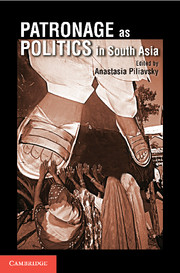Crossref Citations
This Book has been
cited by the following publications. This list is generated based on data provided by Crossref.
JAUREGUI, BEATRICE
2014.
Provisional agency in India: Jugaad and legitimation of corruption.
American Ethnologist,
Vol. 41,
Issue. 1,
p.
76.
Piliavsky, Anastasia
2015.
Patronage and community in a society of thieves.
Contributions to Indian Sociology,
Vol. 49,
Issue. 2,
p.
135.
Chandra, Kanchan
2015.
Democratic Dynasties.
p.
1.
Berenschot, Ward
2015.
Clientelism, Trust Networks, and India's Identity Politics: Conveying Closeness in Gujarat.
Critical Asian Studies,
Vol. 47,
Issue. 1,
p.
24.
Wouters, Jelle J. P.
2015.
Polythetic democracy.
HAU: Journal of Ethnographic Theory,
Vol. 5,
Issue. 2,
p.
121.
van Dijk, Tara
Bhide, Amita
and
Shivtare, Vinay
2016.
When a participatory slum sanitation project encounters urban informality: The case of the Greater Mumbai Metropolitan Region.
International Area Studies Review,
Vol. 19,
Issue. 1,
p.
45.
Piliavsky, Anastasia
and
Sbriccoli, Tommaso
2016.
The ethics of efficacy in North India'sgoonda raj(rule of toughs).
Journal of the Royal Anthropological Institute,
Vol. 22,
Issue. 2,
p.
373.
Koster, Martijn
2016.
Brokers in Participatory Urban Governance: Assembling Formal and Informal Politics.
L’Espace Politique,
Peacock, Vita
2016.
Anthropology inside out.
HAU: Journal of Ethnographic Theory,
Vol. 6,
Issue. 1,
p.
135.
Winchell, Mareike
2017.
Economies of obligation: Patronage as relational wealth in Bolivian gold mining.
HAU: Journal of Ethnographic Theory,
Vol. 7,
Issue. 3,
p.
159.
Ghertner, D. Asher
2017.
When Is the State? Topology, Temporality, and the Navigation of Everyday State Space in Delhi.
Annals of the American Association of Geographers,
Vol. 107,
Issue. 3,
p.
731.
Gugler, Thomas K.
2017.
Book Review: Nicolas Martin. 2016. Politics, Landlords and Islam in Pakistan.
Journal of South Asian Development,
Vol. 12,
Issue. 2,
p.
203.
Gould, William
2017.
Paper, public works and politics: tracing archives of corruption in 1940s–1950s Uttar Pradesh, India.
Contemporary South Asia,
Vol. 25,
Issue. 1,
p.
38.
Parthasarathy, Ramya
2017.
Ethnic Quotas as Term-Limits: Caste and Distributive Politics in South India.
Comparative Political Studies,
Vol. 50,
Issue. 13,
p.
1735.
Maiorano, Diego
and
Manor, James
2017.
Poverty reduction, inequalities and human development in the BRICS: policies and outcomes.
Commonwealth & Comparative Politics,
Vol. 55,
Issue. 3,
p.
278.
Verstappen, Sanderien
2017.
Mobility and the Region.
Journal of South Asian Development,
Vol. 12,
Issue. 2,
p.
112.
Aspinall, Edward
Rohman, Noor
Hamdi, Ahmad Zainul
Rubaidi
and
Triantini, Zusiana Elly
2017.
VOTE BUYING IN INDONESIA: CANDIDATE STRATEGIES, MARKET LOGIC AND EFFECTIVENESS.
Journal of East Asian Studies,
Vol. 17,
Issue. 1,
p.
1.
Hill, Eleanor
Sobolewska, Maria
Wilks-Heeg, Stuart
and
Borkowska, Magda
2017.
Explaining electoral fraud in an advanced democracy: Fraud vulnerabilities, opportunities and facilitating mechanisms in British elections.
The British Journal of Politics and International Relations,
Vol. 19,
Issue. 4,
p.
772.
Koskimaki, Leah
and
Upadhya, Carol
2017.
Introduction: Reconsidering the Region in India.
Journal of South Asian Development,
Vol. 12,
Issue. 2,
p.
89.
OSELLA, FILIPPO
2018.
Charity and Philanthropy in South Asia: An introduction.
Modern Asian Studies,
Vol. 52,
Issue. 1,
p.
4.



